Hello!
Welcome to the last episode of the conversations with Amoun! I hope you have learned something new about the Dom people in each video as well as the Domari Society in Jerusalem. In today’s video we discussed the life of the Dom as well as their experiences, especially that of Amoun and the Dom people in Jerusalem. I learned a lot from Amoun about the lives of the Dom people. As Amoun mentioned, the Dom people originated in India and can now be found all over the world with large concentration in the Middle East. Because of the fact that they find themselves mixed with other communities, they are influenced in areas like their languages and lifestyles.
It was saddening to hear the struggles that the Dom children face just to have access to education. In Amoun’s book, she mentioned teachers who did not want her in their class after knowing she was from the Dom community. This kind of discrimination existed then and, unfortunately, it is still present now. The Dom people face discrimination in many areas, and this causes a lack of opportunities as well as a lack of access to resources. Amoun shared that despite the discrimination and exclusion that they face, the Dom people continue to be resilient and work towards a better future.
Thankfully, there are efforts to create safer spaces for the Dom people as well as to spread information to others so that the Dom people can be better understood. I hope this video series helped viewers in a way to better understand as well as inspired viewers to learn more.
Thanks for watching and look forward to more content in the future!
Jaya, DRC Summer Intern










